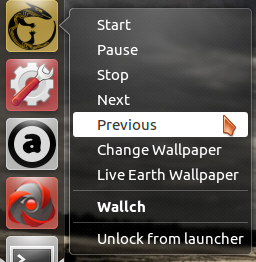1.3 KiB
1.3 KiB
Custom Linux Desktop Launcher Actions
On many Linux environments, you can add custom entries to its launcher
by modifying the .desktop file. For Canonical's Unity documentation,
see Adding Shortcuts to a Launcher. For details on a
more generic implementation, see the freedesktop.org Specification.
Launcher shortcuts of Audacious:
Generally speaking, shortcuts are added by providing a Name and Exec
property for each entry in the shortcuts menu. Unity will execute the
Exec field once clicked by the user. The format is as follows:
Actions=PlayPause;Next;Previous
[Desktop Action PlayPause]
Name=Play-Pause
Exec=audacious -t
OnlyShowIn=Unity;
[Desktop Action Next]
Name=Next
Exec=audacious -f
OnlyShowIn=Unity;
[Desktop Action Previous]
Name=Previous
Exec=audacious -r
OnlyShowIn=Unity;
Unity's preferred way of telling your application what to do is to use
parameters. You can find these in your app in the global variable
process.argv.
